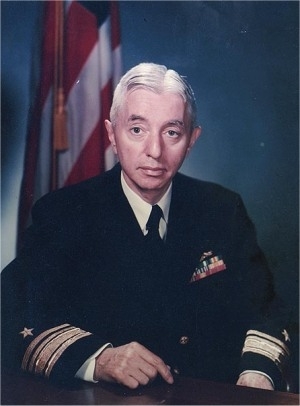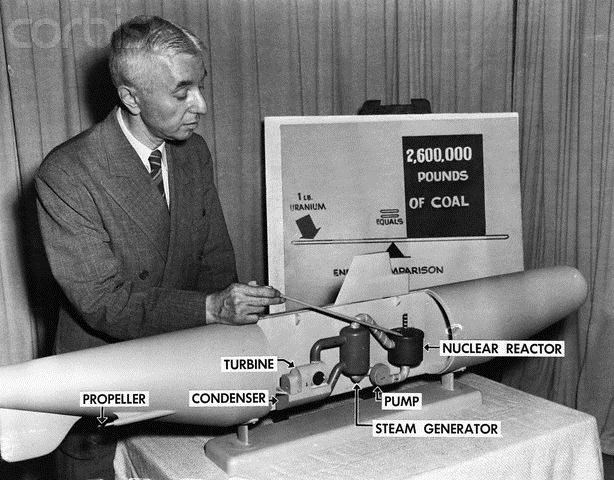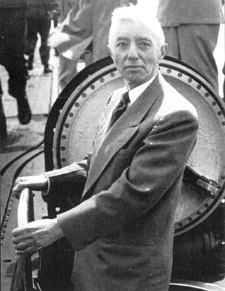 |
| Admiral Hyman G. Rickover |
"Striving for success without hard work is like trying to harvest where you haven't planted" (David Bly). This quote accurately describes the mentality by which Admiral Hyman G. Rickover lived his life. From when he first entered the U.S. Naval Academy in 1918 until his final years as an Admiral, Rickover pushed himself to work in a tireless and persevering manner. He dedicated 63 years of service, which is the record for any active-duty officer in the Navy. Within that time Rickover held many leadership roles including: head of the Nuclear Power Branch of Bu Ships in 1948, (when the U.S. Navy had made a firm commitment to develop nuclear propulsion) and in 1949, chief of the newly established Naval Reactors Branch of the Atomic Energy Commission (AEC). These positions granted Rickover the power and autonomy to initiate action in research of nuclear reactors for shipboard power, without having to consult the chain of command first. This factor, coupled with Rickover’s style of command which had no regard for working around the clock conceived the world’s first nuclear submarine within a mere five years. “In 1954 the first atomic submarine, Nautilus, was launched” (Newsmakers). Hyman G. Rickover is my hero because he founded the nuclear navy and demonstrated the indispensable principles of hard work and excellence.
 |
| Model of Rickover's Nuclear Submarine |
Although Rickover was an abrasive and callous man, he was both diligent and efficient. Consequently, he developed an admirable reputation for his work ethics. In fact, he was considered to be "...an officer who got things done. His admirers were numerous and pointed to his stress upon excellence at a time when laxness seemed to be pervading the armed forces and society as a whole" (Encyclopedia of World Biography). Rickover stuck to his belief in hard work and the achievement of perfection instead of conforming to the negligence the military was currently exhibiting. In this regard he was one of the few lone wolves, so he was easily recognized for this characteristic. The U.S. Navy was very lucky to have Rickover because his hard labor did not go to waste. "Rickover was responsible for the design and design development of the world's first nuclear engines and for the conversion of the U.S. Navy from an oil- to a nuclear-powered force, resulting in technological, tactical, and strategic changes unparalleled in naval history" (Newsmakers). Also, "During World War II Rickover served as the head of the Electrical Section of the Navy's Bureau of Ships, during which time he was credited with inventions and innovations, including, infra-red signaling and magnetic mine sweepers" (Newsmakers). Rickover was not an officer who worked his tail off for little or no fruit. He legitimately got things done, for within the span of his career he had upgraded the U.S. Navy with incredible war technology and the first nuclear powered ships the world had ever seen. These impressive inventions, as well as his two well-earned Congressional Gold Medals, were not what made him a hero; rather it was his sentiment towards hard work and putting it into practice that made him mighty.
 |
| Rickover Inspecting the USS Nautilus |
Rickover believed that one should never accept anything short of excellence. He heavily incorporated this principle into his work, making sure that every miniscule detail of it could be as flawless as possible. "Rickover not only helped design a reliable and compact nuclear reactor, but also set incredibly tough standards for quality control, personnel selection and training, and ship design" (Science and Its Times). This is because he didn't mind the sweat, as long as it could bring forth the excellence he craved so desperately. Rickover ensured that his nuclear submarines would be superior in every way. Designing a reliable and compact nuclear reactor was not enough for him as it would've been for most others; he also had to make sure everything was faultless. To that end he took upon himself an exceedingly burdensome responsibility, "...by insisting that safety considerations required him to personally approve officers of all nuclear-powered ships..." (Encyclopedia of World Biography). In his quest for absolute completion, Rickover intentionally put the well-being of others before his own. By insisting that he personally approve every officer he guaranteed that his nuclear ships would be both safe and efficient. By striving for excellence, Rickover was not only responsible for the creation of the finest nuclear navy in the world, but he also set a powerful example for those willing to go the few extra miles.
Hyman G. Rickover was a true hero because throughout his life he demonstrated absolute diligence and always did more than was required. His hard work produced advanced technology for the U.S. and his hunger for perfection induced the U.S. Nuclear Navy to become the finest in the world. Rickover's life is a model for intense, passionate work. Our country’s education system needs heroes like Rickover for it cannot compare with that of India’s or China’s. Rickover's work ethics are the perfect example for us all to follow. Therefore, we must all do our part by finding the more difficult way around, and going down the long trek.
Hyman George Rickover." Encyclopedia of World Biography. 2004. Encyclopedia.com. (December 15, 2010).
"Hyman Rickover." Newsmakers. Detroit: Gale, 1986. Gale Student Resources In Context. Web. 11 Dec. 2010
Karam, P. Andrew. "Admiral Hyman George Rickover." Science and Its Times. Ed. Neil Schlager and Josh Lauer. Vol. 7: 1950 to Present. Detroit: Gale, 2001. 566-567. Gale Virtual Reference Library. Web. 15 Dec. 2010.
"Rickover, Hyman George (1900-1986)." Encyclopedia of World Biography. Detroit: Gale, 1998. Gale Student Resources In Context. Web. 11 Dec. 2010
Page created on 1/21/2011 12:00:00 AM
Last edited 1/21/2011 12:00:00 AM
